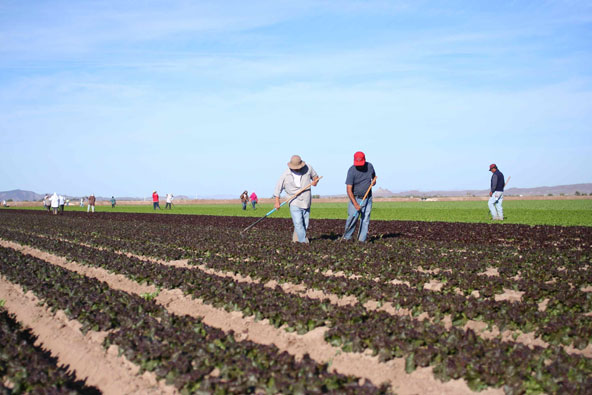
SAN LUIS, Ariz. — Farmworkers line up on the Mexican-side of the border at 1 a.m. They wait a couple hours before getting into the field for a day’s work.
The work itself can be backbreaking. Farmworkers spend the first few hours under high-powered lighting, harvesting lettuce and other vegetables, which require constant bending and squatting.
“The fields, that’s the toughest work,” said Demitrio Jimenez, a farmworker who gathered with about a hundred others for a Dec. 1 Farmworker Appreciation Mass celebrated by Tucson Bishop Gerald F. Kicanas.
Farmworkers get $9 an hour in the United States. They get $9 a day in Mexico. “I can’t complain,” Jimenez said. “That’s how my family eats. I just wish they treated us with more respect.”
That’s where the Independent Agricultural Workers Center comes in. The center, or “CITA” as it’s known by its Spanish-language acronym, matches farmworkers from Mexico with legal, temporary agricultural jobs in the United States.
CITA helps farmworkers and growers navigate the often-unwieldy federal H-2A guest worker visa. Growers, in turn, agree to provide fair working conditions.
“It’s hard here, really hard,” said Agustín Flores, explaining that he wouldn’t think of subjecting his family to these conditions. His wife and children live in Guanajuato, Mexico.
When the day is through, farmworkers return to Mexico to rest. They get up in the middle of the night to wait in line again.
“I couldn’t afford to live here,” Flores said of the United States. “There isn’t enough money to survive. Most of us return every day.”
Aurelia Navarro’s father brought her over legally as a child. “This is the land of opportunities,” she recalled her father telling her. “You have to work.”
She’s spent 20 years working in the fields, has become a citizen, and now the company she’s worked for isn’t taking care of her retirement. “You get old,” she said, “and you can no longer work. Now what?”
Bishop Kicanas, who also serves as chairman of Catholic Relief Services, a supporter of CITA, recognized the sacrifice of the farmworkers during the Dec. 1 Mass. “God gave us fruits and vegetables,” he said. “Today, we give thanks for your work, which brings God’s food to all of us.”
The bishop also led a prayer at the opening of a new CITA office building, through which the program will expand its reach. The plan is to recruit at least 7,000 workers for jobs, as needed. CITA has already worked with growers in Pennsylvania, Texas, Wyoming and California and they’re planning on doing more.
CITA began in 2007 as a program funded by the Catholic Campaign for Human Development, according to Joanne Welter, director of the Office of Human Life and Dignity for the Diocese of Tucson. “Cesar Chavez lived here, but what are we doing for farmworkers?” Welter recalled saying at the time.
Through CITA, farmworkers learn what’s expected of them and what to expect of their employers, according to Janine Duron, the program’s executive director. “They learn their rights and responsibilities.”
The relationship continues after the workers are hired, with CITA providing workers a support network. The program also enables CITA to engage employers in ethical treatment of their workers. If a grower doesn’t comply, CITA no longer facilitates workers for them.
“This program helps reduce illegal immigration,” Duron said. “Families can stay in Mexico. With the money they make here, farmworkers have started micro-businesses at home.”
The program also benefits growers. Georgia lost millions of dollars in crops last year because the state didn’t have enough harvesters in the field, according to philanthropist Howard G. Buffett, who attended the Mass and dedication. The Howard G. Buffett Foundation funds CITA.
Buffett said immigration needs to be understood in two ways: “There’s farmworkers and then there’s everything else.”
If farmworkers are set apart, there’s a better chance for a more specific reform, Buffett suggested. But the impetus needs to come from the industry.
“There is no American that I know of that would get up at 1 a.m., do some of the hardest work I’ve ever heard of, and then get up the next day to do it again,” he said, arguing that “farmworkers don’t take American jobs — they support jobs for Americans.”
Farmworkers don’t just support farmers. Truck drivers earn a living by transporting the harvest, supermarket employees have jobs receiving the crops and the fresh fruits and vegetables nourish families.
“It takes labor to do what we depend on,” Buffett said. “We need to reframe the debate around food safety. This eventually becomes a food security issue in this country — maybe not in 10 years, but in 30-40 years.”
Buffett met a man in Oaxaca who’d lost his leg riding a train up from southern Mexico. Buffett asked him, “How are you getting home?” And the man responded, “I’m not going home. I’m going north.”
“People don’t understand the motivation behind this,” Buffett said. “This problem isn’t going away. This isn’t a problem that you can fence off.”







